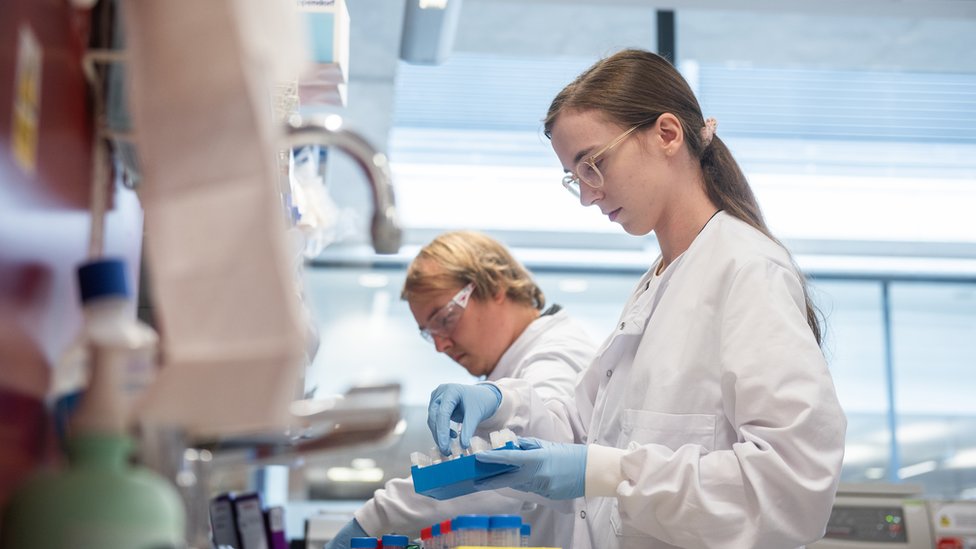Called AZD1222 or ChAdOx1 nCoV-19 the viral-vector vaccine is made from a weakened version of. Teresa Lambe Dr Sandy Douglas Prof.
 Covid 19 Oxford University Vaccine Is Highly Effective Bbc News
Covid 19 Oxford University Vaccine Is Highly Effective Bbc News
The site is updated regularly to make sure it is as accurate as possible and overseen by academic staff at the cutting edge of vaccine research.

Oxford university vaccine. Catherine Green and Prof. The Oxford vaccine named ChAdOx1 nCoV-19 is based on a different technology to the two recent mRNA vaccines from PfizerBioNTech and. The Vaccine Knowledge Project is managed by Oxford Vaccine Group an academic research group in the Department of Paediatrics at the University of Oxford.
Oxford University has today paused trials of its coronavirus vaccine in children while regulators probe the jabs link to rare blood clots. A spokesperson for the prestigious university said the. The Oxford UniversityAstraZeneca vaccine has been approved for use for people 18 years or older and consists of two doses with the second dose administered 4.
The University of Oxfords Jenner Institute and Oxford Vaccine Group have been at the forefront of scientific endeavour to develop vaccines for diseases of major global importance for more than 30 years. Trials involving 1077 people showed. Sarah Gilbert a professor of vaccinology at the University of.
The virus vaccine developed at Oxford University works perfectly and builds strong immunity to virus a study has suggested file photo Oxford coronavirus vaccine works perfectly and. This means that the vaccine is a GMO. Research Coronavirus COVID-19 vaccine.
The Oxford-AstraZeneca vaccine for COVID-19 ChAdOx1 nCoV-19 is made using a modified adenovirus which is used to carry the genetic code for the coronavirus spike protein. The Oxford Vaccine Centres COVID-19 vaccine trial is being run by the Jenner Institute and Oxford Vaccine Group. A coronavirus vaccine developed by the University of Oxford appears safe and triggers an immune response.
Research by Oxford University suggests all major vaccines carry a similar risk of rare clots and all seem to have much lower risk than infection with COVID-19. Indeed the vaccine which is expected to play a vital role in ending the coronavirus pandemic has been many years in the making. The MHRA says anyone who has these symptoms four or more days after receiving the Oxford-AstraZeneca vaccine should seek prompt medical advice.
Our vaccine work is progressing quickly. The adenovirus has been modified in this way to prevent it from replicating inside the body so that it cannot cause an infection. Oxfords coronavirus vaccine has been approved for use in a number of countries marking an important milestone in the fight against COVID-19.
Their team includes scientists from both the Jenner Institute and the Oxford Vaccine Group who bring together decades of internationally recognised experience in vaccine research including responding to the Ebola outbreak of 2014. The University of Oxford is to lead the first trial to explore alternating different COVID-19 vaccines to explore the potential for flexibility in delivery and look for clues as to how to increase the breadth of protection against new virus strains. Derek Chauvin Trial Stream CBSN Live.
The team who started work on developing a vaccine to prevent COVID-19 on 20th January 2020 is led by Prof. The Oxford COVID-19 vaccine team is led by Prof Sarah Gilbert Prof Andrew Pollard Prof Teresa Lambe Dr Sandy Douglas Prof Catherine Green and Prof Adrian Hill. Existing vaccines may protect against the Brazilian coronavirus variant.
Scientists at the University of Oxford have released pre-print data measuring the level of antibodies that can neutralise or stop infection from variants that are circulating in South Africa Brazil and elsewhere. Research Coronavirus COVID-19 vaccine. Work began on the Oxford vaccine in January.
Oxford University announced on Tuesday that it was suspending a trial of the Covid-19 vaccine that it developed with AstraZeneca on children and. A severe or persistent headache Blurred.
